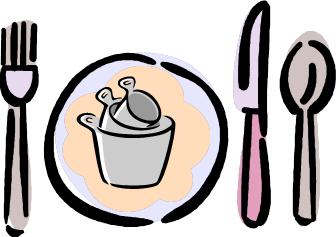How Much Food is Enough?

RETRAINING MY OVEREATER’S BRAIN
Early and prolonged satiety (the sense of having eaten enough food for now) is the name of the band’s game, and restriction (the feelings that communicate satiety to a bandster) is a greatly misunderstood term. I talk a lot about what a bad idea it is to eat until your band’s alarms flash and bells clang, but let me step off my soapbox for a moment and tell you about my own satiety experiences.
When I was obese, I could never eat enough food. Aside from my love of its smell and taste, of chewing and swallowing, I wanted a full belly. The problem with that was that there isn’t enough food in the entire universe to fill the hole in my belly, never mind the hole in my soul. As a pre-op, I had the vague idea that my band would help me eat less, but I had no recent experience of eating small amounts and no idea of how that would feel. I blindly committed to weighing and measuring small portions of food despite the sense of deprivation that aroused in my overeater’s heart.
It wasn’t until perhaps six months post-op that I realized I wasn’t actually hungry after eating my measured meal. Often I wanted to eat more – because the food tasted so good, I’d looked forward to it so much, I deserved it even more, or because I was a good girl who always cleaned her plate. But none of that “head hunger” was related to an empty, hurting, grumbling tummy.
That was a shocking discovery for someone who had eaten to the point of Thanksgiving Dinner Full every day, every meal, every snack, for over 20 years. I suppose that until I came to that realization, I had been doing as much (if not more) of my weight loss work as my band had been doing. It didn’t really matter, because by then, as I inched closer and closer to my goal weight, I was also realizing that my band and I would have to go on working together for the rest of my life. So whether lessons came to me early or late, they were all valuable.
Looking back now, I think my band and my conscious commitment to my dietitian’s food plan were both helping me to retrain my brain. No matter what you’re trying to do – lose weight, run a marathon, raise a child – survival and success depends a great deal on practice. Like a concert pianist playing scales, you have to practice over and over and over again in order to keep your skills sharp. To feel that I had regained some control over my eating with the help of my band, to no longer feel enslaved to food, was worth all the risk and trouble of weight loss surgery. So imagine my delight as time went on and my brain-band partnership got even stronger and better.
HOW TO RECOGNIZE SATIETY
Eventually I progressed to my next band lesson: learning to recognize satiety and stop eating as soon as I felt it, even if that meant leaving food on my plate. It was easy enough to weigh and measure my food when I was at home, but I needed more portable skills to take with me to social events and on business trips.
First, I’ll re-state a definition: when you’re satiated with food, you're no longer hungry and more food doesn't interest you. You’ve just had enough for now. Hard to imagine, isn’t it? Satiety is registered by both conscious and unconscious processes, and the two may not always be in synchronization, especially in an obese person who's been overeating consistently.
It's entirely possible to be physically satisfied but mentally unsatisfied after a meal, for reasons that are unique to everybody and shared by some of us. Each brand and model of the adjustable gastric band is clearly defined in its specifications, executed in the manufacturing process, and policed by quality assurance technicians, but human beings are very unique, so we respond to the band in different ways.
So, how do you know when to stop eating? Do you eat until you're full? No, you don't. You have to figure out a new stopping point.
The overeater's definition of "full" is the normal eater's definition of "stuffed". Most of the time, the normal eater stops eating when they've had enough, not when they're full, but the control center in an overeater's brain doesn't get the "enough" message soon enough, or it exerts a powerful override, so the overeater keeps eating long after the normal person would have stopped. That person keeps on eating until all the food is gone, then goes looking for more. Also, overeaters often use food for emotional rather than physical nourishment. While there certainly is some psychic (non-physical) value in the experience of eating, food cannot fill you up emotionally. When you eat for reasons unrelated to physical nourishment, you will never experience “enough”.
For a bandster, satiety is not quite the same as being full, nor should it be. Full means your upper stomach has reached its maximum capacity. Satiety happens on your way to being full. With a properly adjusted band, you will be comfortable if you stop eating when you're satiated, but you experience discomfort if you eat until you're full.
The band gives almost instant feedback about your eating behavior. The feedback comes in the form of the Soft Stop and Hard Stop signals. In order to learn and recognize your own stop signals, you’ll need to slow down and pay very close attention to how your body feels when you eat. If you usually eat with a crowd (family, friends, coworkers), you might need to try eating by yourself so you won't be distracted. Stop signals can be subtle and they can come from unexpected parts of your body. It's better to heed a gentle reminder than wait for a hammer to hit you on the head.
Soft stops are your early warning system, gentle reminders from your body that it's time to stop eating. Because they don't hurt much, they're easy to ignore. Your job is to recognize them (even though they may vary by the meal or the day) and heed them every time you recognize them.
Hard stops are the equivalent of running into a brick wall. They can happen without any apparent warning, but usually you have sped heedlessly past a soft stop before you hit the wall. Hard stops are the painful and sometimes embarrassing reminders that you have eaten too much, too fast, in bites that were too big, without chewing enough.
To see lists of common soft and hard stop signals, click here:
http://jean-onthebandwagon.blogspot.com/2013/03/stop-eating-signals.html
Ya think?
I don't know what went wrong with it. I've studied English, French, Spanish, Portuguese and Chinese, but html is a foreign language to me.
Anyway, I think it's fixed now.
Thanks!
*** When I was obese, I could never eat enough food. Aside from my love of its smell and taste, of chewing and swallowing, I wanted a full belly. The problem with that was that there isn’t enough food in the entire universe to fill the hole in my belly, never mind the hole in my soul .***
..........and this was the prob with me...your words touch me jean as always.
I totally understand where you are coming from Jean. I used to even after surgery fill my plate full thinking I was going to eat it all. Then after about six bites the rest went into the garbage because I wasn't full I was satisfied. We have to understand that we don't eat to get full anymore but satisfied. Even now my husband will make me a big plate and I take it back and put things back in the pot and he will say that isnt enough food and I say Yes it is. If I want more later I will eat it. Just like today he cooked chicken, rice and Beans and I ate 1 thigh. He wanted to pile other stuff on my plate and I said no I will eat the beans as my next meal. I think being satisfied is a problem with most people who are banded because they don't give their stomach time to say ok I can live with that amount I really am not hungry anymore. My relationship with food has surely changed a whole lot. Great article keep doing what you do.
The statement "that there isn’t enough food in the entire universe to fill the hole in my belly, never mind the hole in my soul..." resonated with me. Many of us have used food to fill the emotional voids in our lives.
For me, as an impoverished, underweight little girl growing up in a horrifically abusive household, food grew to be my panacea in my early adult life when unresolved issues reared their heads.
Through counseling, the love of my husband and his family, I learned to love and accept myself, warts (band) and all.
Nice article, Jean
While I already knew these things, the article Gibbs slapped me in the head (NCIS ref). I needed to hear this said this way. Thanks for the inspiration and helping me think another way.
Jean, Thank you for this article.
I had my 3rd fill last week. Since that point I have FINALLY felt some notable physical changes while I eat.
I am 125 days post op & 15 # weight loss post op. I was begining to believe nothing would ever happen....
I've have been following all the eating guidelines and "waiting" patiently to reach this stage of lapband journey. 9 I think this is what some posters here refer to as lapband hell?)
So, for the past 7 days I have experienced many of the Soft stops & 1 of the Hard stops you described!
I will pay even closer attention now. I feel this is the most useful thing I've read on this board.
Thank you so Much!
I am a happy girl this week!
I Absolutely love reading your articles. They are so informative to the untrained mind. When you said it takes practice.. oh boy is that the truth!! Thank you for article! ![]()
Thank you for this.... I feel like Im at a stand still. This is just what I needed to hear!
Wonderful as always lady! You are a true gift to this forum!
Thank you so much for this. I am 2 1/2months post op and still sometimes fill my plate too much. I each 6 or 7 bites and the rest goes to the fridge for later or in the trash. I told my husband yesterday I don't know why I still do that. I know I cant eat that much. This was great for me to read.
















Terry Poperszky 2,784
Posted
Umm Jean, you may want to edit this for readability.
Share this comment
Link to comment
Share on other sites